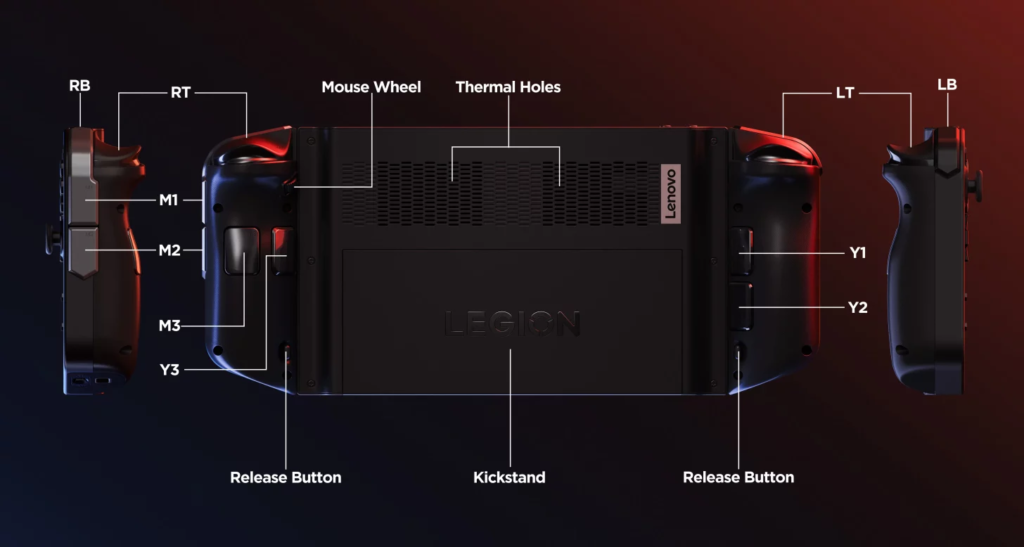Ryzen Z1 application processor units (APUs) and an augmented reality (AR)-powered immersive gaming experience are both featured in the new Legion Go portable console from Lenovo, which has now been formally introduced.
With Cutting-Edge Capabilities and Ready to Take on Steam Deck and ROG Ally, Legion Go is Ready to Compete in the Market
The manner in which the firm approaches “Legion Go” is principally responsible for the product’s meteoric rise to prominence in the sector. The portable device that runs on Windows has incorporated all of the prominent features found in its rivals’ handheld products, which positions it as one of the most versatile and advantageous choices now available on the market.
Starting with the onboard characteristics, the Legion Go will have AMD’s Z1 Extreme APU, whose outstanding capabilities have propelled the portable market to new heights. The handheld has 16GB of LPDDR5X-7200 memory, which has fast speeds and will elevate gaming on the device. You get a micro-SD slot that can accommodate up to 2TB of additional storage in addition to a PCIe Gen4 SSD that can store up to 1TB. The portable has all the “goodies” one could ever need, yet this isn’t what makes it interesting.
The device’s enormous 8.8-inch QHD+ 16:10 screen, which supports 144Hz refresh rate and brightness up to 500 nits, astounds me in particular. When contrasting conventional gaming systems with portable handhelds, Lenovo has closed the gap. While the large screen size had trade-offs in terms of weight and battery life, it would give a user the impression that they were holding an enormous amount of power in their hands.
The Legion Go’s thermal performance is excellent because to the use of “Coldfront thermal technology,” which includes a 79-blade liquid crystal polymer fan and enables the device to meet high TGP objectives without experiencing thermal throttling. Although the effectiveness of this cooling system has not yet been evaluated, it should be on par with other components of the portable device given that Lenovo has used a premium approach with “Legion Go.”

Regarding onboard controllers, the Legion Go has surely given the Nintendo Switch a run for its money by incorporating removable joysticks. Since one could easily use the joysticks to play in any position they liked, this change is mostly intended to increase the “portability” of the gadget.
The handheld’s incompatibility with contemporary games is a drawback, as The Verge noted, since the onboard buttons of the Legion Go didn’t correspond to the game’s control choices, resulting in a frustrating experience. Several Windows handheld devices have/had this issue at launch, primarily as a result of businesses installing standard Windows software on the handheld without optimizing it for the device. The normal customer, who seeks perfection out of the box, is in fact ruined by this.
Also noteworthy about the Legion Go is the company’s choice to expand mobile gaming to AR-enabled devices in order to offer a more immersive experience. Lenovo sells the USB-C-powered Legion Glasses separately. The glasses include speakers integrated in, a 60Hz refresh rate, and micro-OLED technology.
It wouldn’t be appropriate to label this action a “gimmick” in this situation. However, this strategy raises a lot of problems, particularly in regards to the Legion’s Go power management and how the AR Glasses influence it. While we shouldn’t leap to conclusions just yet, it is a feature that deviates from the industry standard and should be commended as a result.
By November 2023, The Legion Go should be accessible to everyone, with prices beginning at €799 EUR. The price of the Ryzen Z1 Extreme model hasn’t been disclosed by the manufacturer, but we anticipate it to be comparable to the ROG Ally. It will be fascinating to see if the Legion Go turns out to be as “versatile” as described, and prospective buyers should hold off until they have read reputable evaluations.

[…] who run their programmes on hardware built by AMD have already felt the benefits of significant optimisations that have been made available since […]
[…] At the beginning of this year, we showed the rest of the world the ROG Ally, a Windows gaming portable that is capable of playing all of your games regardless of where you are. The ROG Ally is a AAA monster that pushes the capabilities of current handhelds to a whole new level with to its brilliant and colourful 1080p 120Hz screen, ergonomic form factor, and fantastic AMD Ryzen Z1 Extreme APU. […]
[…] terms of performance, the AMD Ryzen 3 7440U “Phoenix” APU received a score of 2323 points in the single-core portion of Geekbench 6 and a score of 6571 points […]
[…] In keeping with our mission to offer cutting-edge technology solutions for professionals, Lenovo will announce a newly designed tower workstation with AMD Ryzen Threadripper PRO 7000 WX-Series […]
[…] brands like HP Omen, Lenovo Legion, Dell, Alienware, Acer, ASUS, and MSI as well as top system builders like CyberPower PC, Digital […]
[…] Lenovo TC3401 features […]
[…] The Lenovo Legion Go can use the same 2230 form factor, but it will require an extender. The Steam Deck and ROG Ally are the best options for handheld devices that you can upgrade with this SSD. This SSD is essential for giving your system more space for your preferred games and for enabling much faster operation than you might be used to. […]
[…] 400 dollars is taken off the price tag of this Lenovo 4060 gaming laptop thanks to a discount offered by […]
[…] support 4.0. Newer drives are more efficient, so avoid the 2230. However, there are other issues. Lenovo Legion Go and other devices need intermediate-length M.2 2242 SSDs. M.2 extenders can be used on 2230 drives, […]